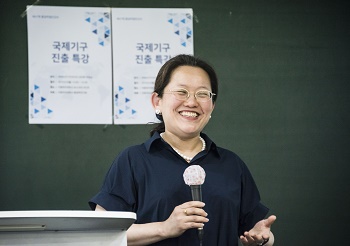
As a double major student in French and English Language and Literature, Kang Min-Whee dreamt of a career in comparative literature or in writing, as she was also the Editor-in-Chief of Ewha Voice in her sophomore and junior years at Ewha. But little did she know that in 1996, a public information poster about the Junior Program Officer (JPO) selection program would change her career path completely.
The JPO program, sponsored by the Ministry of Foreign Affairs, selects young professionals with different skills and expertise to work in various UN agencies for two to three years, which de facto becomes the starting point of a career in the UN system.
When she passed the JPO exam the following spring in 1997, Kang was one of the first 10 young Korean JPOs to serve in the UN. A lot has changed over the past two decades and nowadays, 25 JPOs are selected and deployed annually.
In February 2000 when she arrived in East Timor, the country hardly had any public infrastructure.
“There was smoke rising from the rubbles and ashes that were still hot on the ground, it reminded me of the photos of Seoul after the Korean War,” Kang said.
Kang initially served in the UN Transitional Administration in East Timor (UNTAET) to build the foundations of what was to become the Ministry of Labor and Social Affairs.
“Living and working conditions were very harsh with no electricity nor paved roads in most places. Many people thought young women like me would pack up and return home,” she said.
But East Timor would be the first in a series of many other field assignments, including too dangerous emergency and hardship duty stations, such as the 2004 Indian Ocean Tsunami Emergency Response in Banda Aceh, Indonesia and Afghanistan. She had many stories from the field to share, all highlighting the importance of getting an early field experience in programme implementation.
“During my last assignment with UNICEF in Afghanistan, I used to go on field missions to the remote rural areas in the Central Highlands, where maternal and child mortality rates are still among the highest in the world,” Kang said. “The lack of awareness about proper hygiene and good nutrition was undermining safe pregnancies and child survival in this harsh environment, which is frozen and closed off to the outside world for half the year.”
With the generous financial support of the Korean Government, which is UNICEF’s third largest donor in Afghanistan, Kang oversaw the implementation of large-scale community-based sanitation and hygiene projects to promote improved toilets and hand-washing, alongside maternal and child health projects. Investing in basic hygiene was a critical condition leading to direct positive outcomes for health, good nutritional status and learning outcomes for children in Afghanistan.
Kang shared the four golden rules ascribed to a successful field assignment in the UN.
“As my mentors taught me early on, you must know your country, know your program, know your people, and…never miss lunch,” she said.
Kang has served twice as Country Representative in UNICEF Gambia (2007-2010) and in UN WOMEN Timor Leste (2011-2012).
In late 2017, after two decades of professional experience in the UN system at the global, regional and national levels, Kang was approached by WHO to join the new leadership team of Dr. Tedros as Advisor in his Office of the Director-General.
“I was on a field mission in a remote area of Afghanistan, when I received a call from WHO headquarters in Geneva,” she said. “It was totally unexpected and unbelievable, that I thought it was a prank. The offer to join the new senior management was an honor and privilege that I could not turn down, so I made the hard decision to leave UNICEF and moved to WHO Geneva in December 2017.”
Kang is the first Korean woman to be appointed at the Director level in WHO Geneva Headquarters. She is also the first among Korean JPOs to accede to senior management in the UN at the Director level.
Kang talked at length about the good reputation Koreans have built within the UN and other international organizations.
“Koreans are highly demanded everywhere in the UN, because they are renowned for their diligence and reliability,” she said.
Kang also believes that Korea’s lessons in history and unique development model as seen in the transformation from an aid recipient country to a donor country, can be shared with other countries as an example to inspire them. She also underlined the important role of South Korea to ensure humanitarian aid and development cooperation reaches North Korea, especially the pregnant women and children. This is in South Korea's interest, as the stakes are highest for the two Koreas unlike any other country.
“Whether through the UN or by means of other organizations, I would like to use my expertise to improve the quality of Korean aid around the world and contribute in preparing for the next generation of Korean development practitioners,” Kang said as a concluding remark.

